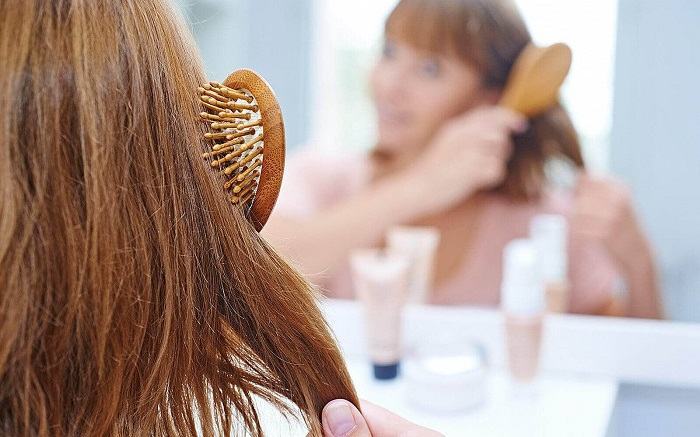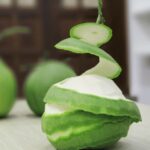1. Nourish Your Hair with Natural Oils
One of the simplest yet most effective ways to restore damaged hair is to use natural hair oils such as coconut, olive, or almond oil. These oils not only provide much-needed moisture but also nourish the hair, making it softer and shinier. For best results, apply a small amount of oil to your hair, especially the ends, which are prone to dryness and split ends.

One of the simplest yet most effective ways to restore damaged hair is to use natural hair oil
Additionally, you can periodically deep condition your hair with oil. Apply oil generously to your hair, gently massaging it into your scalp and hair. Then, wrap your hair in a warm towel for about 30 minutes to enhance moisture retention and stimulate blood circulation in the scalp, promoting hair growth and health. Regular use of natural oils will help restore your hair from within, making it softer, smoother, and stronger.
2. Choose the Right Shampoo and Conditioner
Selecting the right shampoo and conditioner is crucial for maintaining healthy hair. During dry seasons, opt for gentle, sulfate- and paraben-free products, as they can strip your hair of its natural moisture. Shampoos and conditioners containing honey, shea butter, or plant-based extracts are ideal choices.
When applying conditioner, focus on the mid-lengths to the ends of your hair, avoiding the scalp to prevent greasy roots. For optimal results, leave the conditioner on for a few minutes before rinsing thoroughly with water. This habit will leave your hair soft and smooth while minimizing breakage due to dryness.

Apply conditioner from mid-lengths to ends, avoiding the scalp, to prevent greasy roots.
3. Minimize Heat and Chemical Treatments
Frequent use of heat styling tools like blow dryers, curlers, or flat irons, as well as hair coloring, can dehydrate your hair, making it brittle and prone to damage. Especially during dry seasons, heat can further weaken your hair. Therefore, it is essential to minimize the use of heat and chemical treatments on your hair. If necessary, use heat protectant products to shield your hair from the damaging effects of high temperatures.
Instead of relying on heat styling, allow your hair to air dry and opt for gentler styling methods that cause less harm to your hair.
4. Maintain a Healthy Diet and Lifestyle
Diet and lifestyle play a significant role in hair restoration. A balanced diet rich in protein, vitamins, and minerals will provide your hair with the necessary nutrients. Foods such as salmon, eggs, walnuts, spinach, and vitamin C- and E-rich fruits help improve hair health from within.
Staying properly hydrated is also crucial for maintaining moisture in your hair and scalp. Ensure you drink at least 2 liters of water daily to prevent dry and lifeless hair. Adequate sleep and regular exercise promote blood circulation, leading to faster and healthier hair growth.
5. Deep Condition and Use Hair Masks Regularly
Deep conditioning and hair masks are effective ways to replenish moisture and nourish damaged hair. You can use ready-made hair masks or create your own using natural ingredients such as bananas, avocado, eggs, and honey. These ingredients are rich in vitamins and minerals, making your hair softer, reducing dryness, and restoring it from within.
For best results, incorporate a deep conditioning treatment into your weekly hair care routine. After applying the mask, wrap your hair in a warm towel or wear a shower cap for 20-30 minutes. Consistency is key, and you will soon notice a significant difference, with your hair feeling softer, stronger, and shinier.




































